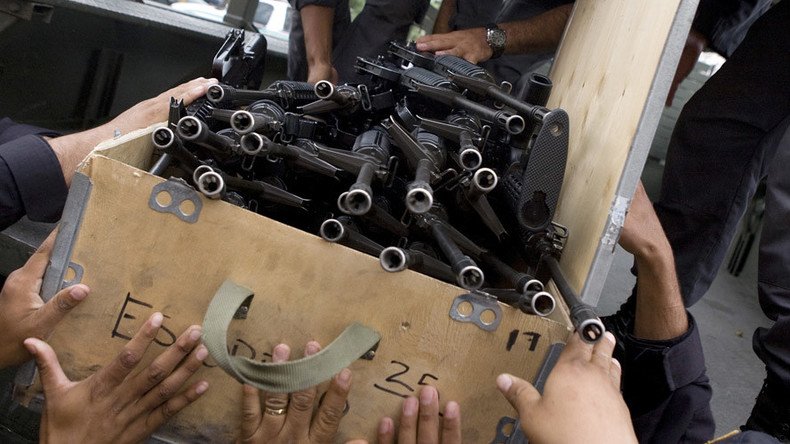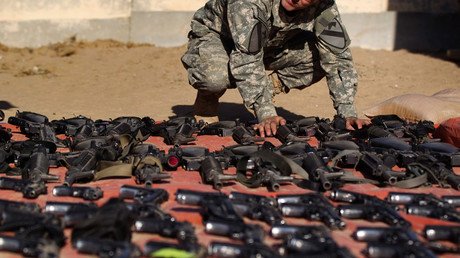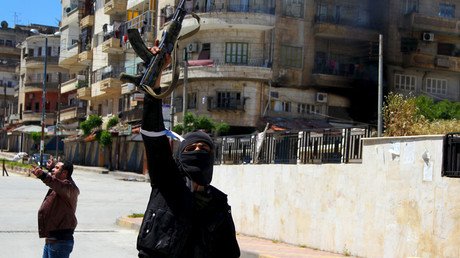‘US ongoing problem – it can’t control its weapons in Mideast’

US weapons ending up in the hands of terrorists and current happenings in Washington DC and the Middle East are reminiscent of the Afghan Mujahideen, said international lawyer and former CIA officer Jack Rice.
American and Jordanian officials testified to the New York Times and Al Jazeera that weapons sent to Jordan by the CIA and Saudi Arabia for Syrian rebels have been repeatedly stolen and sold on the black market. According to the recent report, the CIA-Saudi shipment, under the "arm and train program", included Kalashnikov rifles, mortars and rocket-propelled grenades (RPG).
RT: There have been plenty of previous reports of US weapons ending up in the hands of terrorists. How serious is this latest claim?
Jack Rice: It doesn’t shock me at all. I can go back decades now, when I think about operations and frankly… what this is reminiscent of – is the Mujahideen. You can take a look at exactly what was going on with the CIA, and the Middle East, and specifically with Afghanistan and the inability to control the weapons once you hand them over to somebody else – this has always been a problem for the US. They continue to do it. And despite knowing that they can’t control them, they seem to do it anyway.
RT: Is it surprising the US is still arming rebel groups, despite the huge risks?
JR: It doesn’t really shock me though. What I’ve found over and over again – is there is a desire in the US that somebody fights ISIS; that somebody fights the Damascus regime, but it shouldn’t be Americans. So the best ways to do that is to hand weapons over to somebody else and say: “It’s your problem. It is your fight. You take care of it, or we’ll drop bombs from the sky, but we don’t want boots on the ground; we would rather drop AK-47s, mortars, and RPGs.” That is a much easier thing to deal with. And if some of them end somewhere else: “Oh well…”
RT: What do you make of the State Department's refusal to comment on these recent allegations?
JR: That doesn’t shock me either again. It doesn’t shock me the CIA wasn’t responding obviously, because these are covert operations. But the thing is – it assumes the State Department is actually going to tell you honestly what it is actually going on is a foreign policy approach.
I think we have to contemplate exactly what is going on in Washington DC right now. There is something going on fist in glove with the Agency, the Department and the Pentagon – all three of which are working very closely on these operations. So this doesn’t surprise me at all that nobody is willing to talk about it, especially when things go bad. When things go south who do you think is going to stand up and say: “Yeah, it was me, I am the one who screwed up!” No, nobody is going to say anything.
RT: What are the security implications for Jordan? The country was recently hit by a terrorist attack near the Syrian border, in which seven Jordanian soldiers died.
JR: That is a great point. And that is one of the real problems here: there are security implications – again thinking back to Afghanistan – it is the very same problem. Any time you start providing arms to somebody who is your friend – and that is a very clear and, I should say, not clear definition… The problem is it’s very difficult to determine who your friends are and who your enemies are. And sometimes it’s both.
Those things can end up in all sorts of places for the Jordanians right now. Not they could potentially see a whole series of AKs, mortars, and RPGs that were just rolled through Jordan – that is going to come back at the Jordanians themselves. That is a concern. Remember: these were supposed to go into Syria and into Northern Iraq. That doesn’t mean that is where they end up. They can end up in Western Europe; they can end up in Eastern Europe; they can end up in the southern republics; they can end up in Moscow. We really can’t tell, because once you let go of the weapon, it can end up just about anywhere.
The statements, views and opinions expressed in this column are solely those of the author and do not necessarily represent those of RT.














